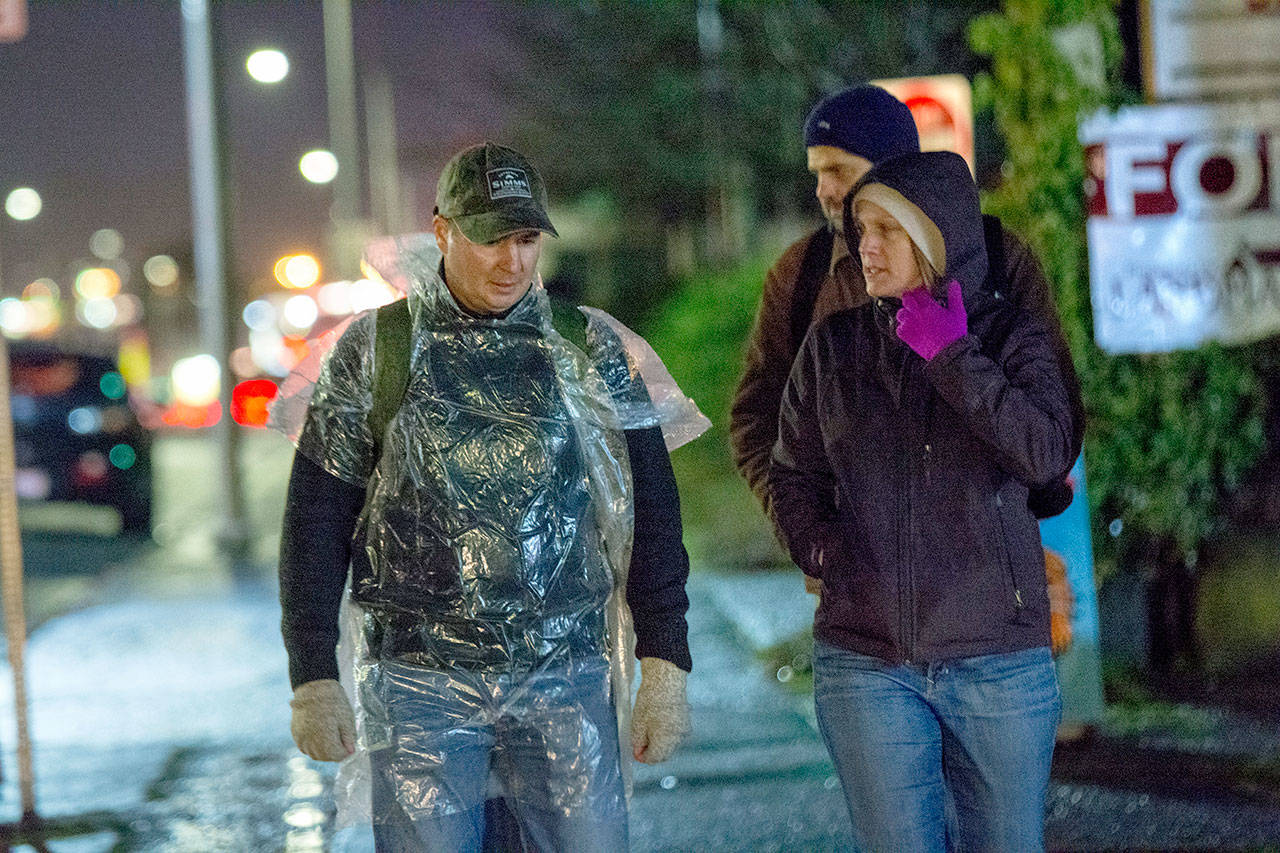PORT ANGELES — Clallam County Commissioner Mark Ozias and Prosecuting Attorney Mark Nichols are the latest government officials to spend a night on the streets of Port Angeles, an experience they both said will help influence policy and decisions in the future.
The two elected officials stayed overnight Thursday at Serenity House of Clallam County’s night-by-night shelter, where they talked with staff and with people who are homeless.
Ozias, who said he understands staying one night at Serenity House of Clallam County’s night-by-night shelter offers only a glimpse into homelessness, said that often policy makers look at how to address issues like homelessness from a systemic level when in fact there are smaller and easier things that can be done.
“We don’t always have to think big picture,” Ozias said. “Thinking small picture can have a bigger impact sometimes.”
Ozias and Nichols are the third pair of elected and appointed officials to take on the challenge.
Amy Miller, who heads the REdisCOVERY program of Volunteers in Medicine of the Olympics (VIMO), and Shenna Younger, VIMO’s director of Development and Operations, stayed overnight at the night-by-night shelter earlier this month before challenging officials from Port Angeles to do the same.
They emphasized that the challenge is not a fundraiser, but is meant for officials to gain first-hand experience that can influence discussions and policy.
After City Manager Nathan West and City Councilmember Mike French stayed overnight, they challenged the City of Sequim.
Sequim City Manager Charlie Bush challenged Clallam County after he and three public works employees stayed a night on the streets of Sequim without shelter.
Nichols said what became clear early on in the night is there are very few restrooms available except for at businesses.
“As you walk through Port Angeles and get past about 5 p.m., the otherwise public facilities are locked down,” Nichols said. “It creates a gap and need that Mark and I wound up experiencing.”
Nichols said that for him the experience confirmed the need for a mental health court, which he feels could help some of the homeless population.
He said there are people who make bad decisions because of underlying mental health disorders, which can lead to being prosecuted by his office, losing a job and losing housing.
“I couldn’t quantify the number of cases that involve mental health driving bad behavior, but it’s probably higher than people think,” he said.
Ozias and Nichols began their night walking around Port Angeles, going to areas where homeless people are known to congregate.
Surprisngly they found few people outside, but had a chance to talk to people once they arrived to the shelter.
Ozias said people were interested in what they were doing, but said that one night isn’t enough.
“They wanted to make sure we understood as best as possible the stresses of chronic homelessness, being cold, and that having so many unknowns day after day is extremely trying,” Ozias said.
Nichols said the experience confirmed much of what he had heard about homelessness in Port Angeles.
He spoke to people who are from the area as well as people who came from somewhere else.
“I had conversations with people from out of the area and they all had different stories of how they came to Clallam County,” Nichols said.
He said that those who said they were from out of the area explained that they had not intended to be in Port Angeles for the long term, but became “stuck,” for various reasons.
They told Nichols they were going through processes in which they hoped to have housing in the not too distant future, Nichols said.
Both Ozias and Nichols spoke highly of Serenity House’s staff, discussing how welcoming they were and how well the staff worked with guests.
“I would encourage other community leaders who don’t have either direct experience or a clear understanding of the shelter to take the time to stop by and visit it, to meet the people who work there and lay eyes on the operation so they can make direct observations so they can advance the discussion I hope our community has moving forward,” Nichols said.
Younger and Miller said Thursday they thought the challenge went well and they were excited to hear how the experience will help shape the ongoing discussion about homelessness and how it will influence policy in the future.
Younger is preparing a debriefing session with officials to discuss what should happen next.
Younger’s top goal was to engage the community in conversation in an attempt to change attitudes about homelessness.
“I knew it was going to spark conversation, but I didn’t anticipate the wildfire that was going to start with it,” Younger said.
Younger and Miller said that since they stayed at the shelter they have been having many conversations with people they normally don’t talk with.
Some of those people see the need to expand services while others want to decrease services.
Some who heard about their experience also began donating and making contributions.
Miller said they have heard from people in other states who have said they were inspired to engage with their communities.
“I’ve tried not to only focus on the more positive comments,” Miller said. “I try to engage openly and honestly and share my experience and my beliefs. It has been a positive experience to challenge people like that.”
Though they see it as an overall positive experience, they said there has been criticism that what they experienced wasn’t really homelessness, a criticism Miller said is accurate.
“We’re not trying to be homeless, live that life or create more homelessness,” Miller said. “We wanted to get a piece of what that was like.”
________
Reporter Jesse Major can be reached at 360-452-2345, ext. 56250, or at jmajor@peninsuladailynews.com.

